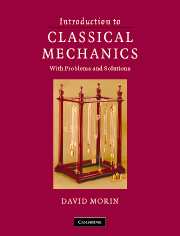Book contents
- Frontmatter
- Contents
- Preface
- 1 Strategies for solving problems
- 2 Statics
- 3 Using F = ma
- 4 Oscillations
- 5 Conservation of energy and momentum
- 6 The Lagrangian method
- 7 Central forces
- 8 Angular momentum, Part I (Constant L^)
- 9 Angular momentum, Part II (General L^)
- 10 Accelerating frames of reference
- 11 Relativity (Kinematics)
- 12 Relativity (Dynamics)
- 13 4-vectors
- 14 General Relativity
- Appendix A Useful formulas
- Appendix B Multivariable, vector calculus
- Appendix C F = ma vs. F = dp/dt
- Appendix D Existence of principal axes
- Appendix E Diagonalizing matrices
- Appendix F Qualitative relativity questions
- Appendix G Derivations of the Lv/c2 result
- Appendix H Resolutions to the twin paradox
- Appendix I Lorentz transformations
- Appendix J Physical constants and data
- References
- Index
5 - Conservation of energy and momentum
- Frontmatter
- Contents
- Preface
- 1 Strategies for solving problems
- 2 Statics
- 3 Using F = ma
- 4 Oscillations
- 5 Conservation of energy and momentum
- 6 The Lagrangian method
- 7 Central forces
- 8 Angular momentum, Part I (Constant L^)
- 9 Angular momentum, Part II (General L^)
- 10 Accelerating frames of reference
- 11 Relativity (Kinematics)
- 12 Relativity (Dynamics)
- 13 4-vectors
- 14 General Relativity
- Appendix A Useful formulas
- Appendix B Multivariable, vector calculus
- Appendix C F = ma vs. F = dp/dt
- Appendix D Existence of principal axes
- Appendix E Diagonalizing matrices
- Appendix F Qualitative relativity questions
- Appendix G Derivations of the Lv/c2 result
- Appendix H Resolutions to the twin paradox
- Appendix I Lorentz transformations
- Appendix J Physical constants and data
- References
- Index
Summary
Conservation laws are extremely important in physics. They are enormously helpful, both quantitatively and qualitatively, in figuring out what is going on in a physical system. When we say that something is “conserved,” we mean that it is constant over time. If a certain quantity is conserved, for example, while a ball rolls around in a valley, or while a group of particles interact, then the possible final motions are greatly restricted. If we can write down enough conserved quantities (which we are generally able to do, at least for the systems we'll be concerned with), then we can restrict the final motions down to just one possibility, and so we have solved our problem. Conservation of energy and momentum are two of the main conservation laws in physics. A third, conservation of angular momentum, is discussed in Chapters 7–9.
It should be noted that it isn't necessary (in principle) to use conservation of energy and momentum when solving a problem. We'll derive these conservation laws from Newton's laws. Therefore, if you felt like it, you could always (in theory) simply start with first principles and use F = ma, etc. However, at best, you would soon grow weary of this approach. And at worst, you would throw in the towel after finding the problem completely intractable. For example, you would get nowhere trying to analyze the collision between two shopping carts (whose contents are free to shift around) by looking at the forces on all the various objects.
- Type
- Chapter
- Information
- Introduction to Classical MechanicsWith Problems and Solutions, pp. 138 - 217Publisher: Cambridge University PressPrint publication year: 2008



